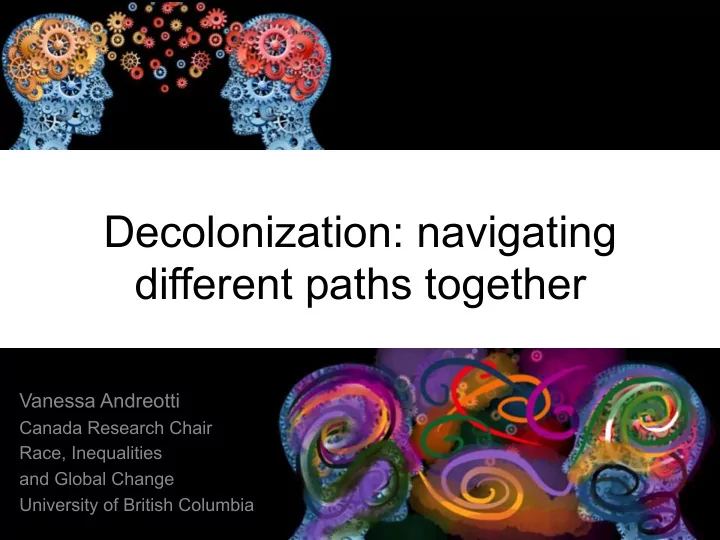

Decolonization: navigating different paths together Vanessa Andreotti Canada Research Chair Race, Inequalities and Global Change University of British Columbia
Agenda • Invitation: experimenting with a different kind of space • Recognizing normalized imaginaries, dispositions of engagement and different theories of change • Engaging with the complex and contested framings of identity • Supporting alternatives and life-sustaining solutions • Re-calibrating expectations: decolonization as life-long- and-wide journey (with no end in sight)
Limitations, Tensions • Not a cure for all, nor an easy fix • Ambiguous solutions • Risk of paralysis, feeling overwhelmed • Challenges of necessary time, will, spaces to learn deeply • Our own limitations and conditions: schooling, experience of race / gender / ableism / orientation, capacity, our own patterns of behavior, investments, our own biases, our experiences in this work • Unrealistic expectations of speed, pace, point of arrival and support required for change
First (most difficult) steps Learning to “breathe” differently together as we travel in a foggy road, experiencing, experimenting, stumbling and learning from failure, requires … • spaces for sober, holistic, multi-voiced and socially accountable engagements • transitional frames: vocabularies, mappings, tools that enable us to expand and deepen conversations and relationships
Experimenting with a different space the stories we tell, inquiry what we want them to do, what they show and what they hide, where they come from, where they lead us to, how they enable or constrain possibilities for co-existence and change … pedagogy opening our imaginaries for other possible ways to tell stories, other beginnings, endings, framings, other ways of knowing, being, relating, walking … in non-coercive ways.
Experimenting with a different space ourselves, each other, conflict hosting in the face of complexity, uncertainty, ambivalence asymmetry, vulnerability, incommensurability with courage, humility, sobriety, discernment Learn ¡to ¡host ¡our ¡own ¡resistance ¡ and ¡to ¡be ¡taught ¡by ¡it. ¡ I ¡lovingly ¡don’t ¡care ¡“what” ¡you ¡ think... ¡ … ¡but ¡I ¡care ¡deeply ¡about ¡our ¡ responsibility ¡to ¡think, ¡relate, ¡feel ¡ and ¡dream ¡deeper ¡and ¡wider. ¡
What ¡disposiAon ¡is ¡manifesAng ¡right ¡now ¡for ¡you? ¡ Dispositions of engagement What ¡disposiAon ¡do ¡you ¡normally ¡encounter ¡in ¡your ¡ context ¡of ¡work ¡for ¡conversaAons ¡about ¡diversity? ¡ ¡
“Normalized” Imaginaries
“Normalized” Imaginaries Not what we don’t imagine as an extension of our knowledge, but what we CANNOT imagine from within our realms of intelligibility (normalized imaginaries).
“Normalized” Imaginaries engagement H egemonic (reinforce/justify status quo) E thnocentric (project one view as universal) A historical (forget historical legacies and complicities) D epoliticized (disregard power inequalities & ideologies) S alvationist/Self-serving (invested in self- congratulatory heroism) U n-complicated (offer ‘feel good’ quick fixes) P aternalistic (waiting for a ‘thank you’)
“Normalized” Imaginaries inclusion tokenization ¡ ¡ (you ¡were ¡brought ¡here ¡so ¡that ¡business ¡can ¡go ¡on ¡as ¡usual) ¡ display ¡ ¡ (you ¡should ¡be ¡available ¡for ¡an ¡equity ¡photograph) ¡ debt ¡ ¡ (you ¡have ¡your ¡place, ¡you ¡should ¡be ¡grateful) ¡ burden ¡ ¡ (your ¡job ¡is ¡to ¡meet ¡all ¡needs) ¡ trap ¡ ¡ (if ¡you ¡articulate ¡a ¡problem, ¡you ¡become ¡the ¡problem) ¡ betrayal/cost ¡ ¡ (your ¡investments ¡must ¡align ¡with ¡ours) ¡ subservience ¡ ¡ (your ¡body ¡is ¡an ¡extension ¡of ¡our ¡entitlements) ¡ ¡ ¡ ¡
“Normalized” Imaginaries Self-awareness Self-reflection Self-reflexivity
“Normalized” Imaginaries discernment Self-disarming Self-de-centering
Normalized Imaginaries of Change Beyond ¡Reform ¡ To ¡disinvest ¡in ¡the ¡ Radical ¡Reform ¡ RecogniAon ¡of ¡a ¡dominant ¡way ¡of ¡knowing ¡ current ¡unsustainable ¡ SoE ¡Reform ¡ RecogniAon ¡of ¡a ¡dominant ¡way ¡of ¡being ¡ world ¡and ¡to ¡walk ¡with ¡ To ¡make ¡the ¡same ¡ To ¡make ¡the ¡same ¡ others ¡into ¡the ¡possibility ¡ world ¡a ¡lot ¡beHer ¡by ¡ world ¡a ¡liHle ¡bit ¡beHer ¡ of ¡new ¡worlds ¡. ¡ including ¡more ¡people, ¡ through ¡personal ¡ ¡ voices ¡and ¡perspecAves ¡ transformaAon ¡and ¡ (IMAGINE ¡the ¡ in ¡collecAve ¡acAon. ¡ individual ¡acAon ¡ ¡ IMPOSSIBLE) ¡ ¡ ¡ ¡ (RETHINK, ¡INCLUDE) ¡ (MAKE ¡A ¡DIFFERENCE) ¡ Systemic ¡& ¡historical ¡ ¡ ¡ analyses ¡a ¡step ¡further, ¡ Systemic ¡& ¡historical ¡ Individually ¡focused ¡ realizing ¡the ¡hidden ¡costs ¡ analyses, ¡mulAple ¡ analyses, ¡single ¡story, ¡ of ¡our ¡investments ¡in ¡the ¡ perspecAves, ¡self-‑ simple ¡soluAons, ¡self-‑ current ¡system, ¡ implicaAng, ¡complex ¡ affirming, ¡comfort ¡ disinvesAng ¡ ¡ soluAons, ¡discomfort ¡ ¡ ¡ ¡ SAME ¡QUESTIONS, ¡ DIFFERENT ¡QUESTIONS, ¡ SAME ¡QUESTIONS, ¡ DIFFERENT ¡ANSWERS ¡ ¡ DIFFERENT ¡ANSWERS ¡ SAME ¡ANSWERS ¡
A few helpful practices • Spend time radically envisioning. Be aware of how you hold creativity back, and where. Interrupt the barriers you place on yourself and others. • Broadly, value and embody healthy and healing spaces for growth, innovation, love and empathy • Encourage critical thinking and dissent • Create conditions and structures that lead to positive cultural identity for people experiencing injustices • Bond emerging alternatives with necessary structures and resources to support them.
Thank you! Resources: ¡ Sonali ¡Balagee: ¡“Equity ¡Lens” ¡ Andreo`: ¡“Torpor ¡and ¡Awakening” ¡ & ¡“MulA-‑layered ¡Selves ¡and ¡DecolonizaAon” ¡ ¡
Recommend
More recommend